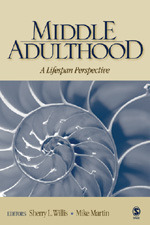Middle Adulthood
A Lifespan Perspective
- Sherry L. Willis - Pennsylvania State University, University Park, USA
- Mike Martin - University of Zurich, Switzerland
Adulthood & Aging
"This book is unique because of the focus on longitudinal studies and international perspectives . . . There is no other book like it . . . This book will be useful both as an advanced undergraduate or graduate course text and as a resource for scholars."
- Rosemary Blieszner, Virginia Polytechnic Institute and State University
"A very strong volume . . . [T]his book will clearly be a 'must-have' for scholars interested in midlife."
- Michael Marsiske, University of Florida
"Midlife is no longer an 'uncharted territory' in human development. A group of outstanding researchers from different countries focuses on this peak period in the life span . . . Various views, including historical, cultural, and socio-structural perspectives, are adopted . . . [C]omprehensive reviews of studies on almost all relevant domains of human development . . . are given and provide a colorful picture of what midlife in these days may be all about."
- Sigrun-Heide Filipp, University of Trier, Germany
Middle adulthood is a critical period of the life course. How we develop in middle age–the central period of our lives–can influence how well we cope in our later years. Middle Adulthood: A Lifespan Perspective explores these issues by bringing together a distinguished group of international contributors associated with a range of prestigious longitudinal studies.
Key Features:
- Presents a much-needed longitudinal, lifespan perspective on middle age
- Provides a multicultural perspective to determine universal normative patterns of midlife development
- Addresses a broad scope of topics, including historical perspectives on the emergence of middle age as a normative developmental period in the life course, change and stability in personality, and cognitive development and decline
Middle Adulthood is designed for scholars, researchers, and practitioners in the field of adult development and aging. It is an excellent text for advanced undergraduate and graduate students studying midlife development in the departments of Developmental Psychology, Human Development and Family Studies, Gerontology, Family Diversity, and Health.
"This edited book is a very interesting and welcome addition to the series of publications recently devoted to the long neglected issue of development during middle adulthood. It adopts a truly lifespan approach, by considering not only development between 40 and 65 years of age, but also the impact that adolescence and young adulthood can exert on midlife, and the continuity from middle age into old age. Through its 10 chapters, it covers a broad range of topics, from the development of the self to cognitive changes to genetic influences. All chapters provide empirical data, based on major longitudinal studies on adult development, with an international coverage. The book also provides a unified perspective, in that midlife is not to be considered a period of mere stability as has often been proposed, but evinces large variability both across individuals and across psychological functions; all chapters demonstrate nicely the necessity of adopting a multidimensional view on development. It represents a well informed synthesis of the current work on midlife development from leading researchers in the field and will prove useful both for advanced students and for other developmental scholars."







